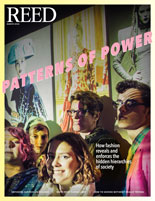
IRIS login | Reed College home Volume 95, No. 1: March 2016
Reediana
Language Making Nature

By David Lukas ’93
By Bill Donahue

As David Lukas sees it, the language we use to describe the natural world has not evolved a whit in the 160 years since Henry David Thoreau wrote Walden. We still rely on the stodgy, male-dominated International Commission on Zoological Nomenclature to ratify and officialize animal names. There are thousands of musical nature words that we almost never deploy (for instance, cumulonimbus, a Latinate term for a towering rain cloud), and meanwhile we have all but surrendered word making to the stultifying corporate powers who’ve given us Xanax, Prozac, WhatsApp, and Uber.
In his daring and inventive new book, Language Making Nature, David, a Portland-based wilderness guide, calls for a linguistic renaissance—for a recognition that “beneath the veneer of modernity the English language is potent with ancient magic-making power.” At once a handbook and a manifesto, Language Making Nature delivers 76 quick lyrical riffs that provide wild suggestions and historical background to students, poets, and anyone else who aims to “awaken language.”
In one piece, David rhapsodizes over how the western Apache Indians have long imbued place names with a pictorial resonance—consider the Apache name that translates to “Circular Clearing with Slender Cottonwood Trees.” He doesn’t offer place names of his own. His impulse is not to show off, but rather to provoke readers’ imaginations. In other essays he argues that the names of animals should be capitalized and that we should savor the emotional and linguistic depth contained in the squawking cries of the raven: kor, krep, kri. Throughout, he insists that we can only be free if we transcend our current clipped parlance—“the language of the conquerors,” he calls it—and embrace language play as “something profoundly creative and freeing. It’s about dissent,” he writes.
The book is in some ways a lament. It mourns the forgotten age when British peasants sidled up to the beorsetl (Old English for “beer settle”) and rues the disappearance of the pugme, a unit of measure that the ancient Greeks defined as the distance from elbow to knuckles. But Language Making Nature is at bottom crazily hopeful. At one point, David implores us to take linguistic inspiration from Tibetan monks, who once carved prayers on wooden blocks and then stamped these blocks on the surfaces of flowing rivers, to imprint their hopes on the world. “The world is stamping its language on us in the same way,” David writes. “Listen for the language of the animals, of trees, rocks, and clouds.”
Early on, David concedes that many word experiments “will (and should) fall by the wayside.” He’s right, of course: Most of the ideas that he sparks to life will in time fade away, like so many fluffs of dandelion riding the wind. But before they disappear, Language Making Nature will open our eyes. This book is a wonder, an invitation, and a challenge to which we can only assent with solemn awe: kor, krep, kri.

LATEST COMMENTS
steve-jobs-1976 I knew Steve Jobs when he was on the second floor of Quincy. (Fall...
Utnapishtim - 2 weeks ago
Prof. Mason Drukman [political science 1964–70] This is gold, pure gold. God bless, Prof. Drukman.
puredog - 1 month ago
virginia-davis-1965 Such a good friend & compatriot in the day of Satyricon...
czarchasm - 4 months ago
John Peara Baba 1990 John died of a broken heart from losing his mom and then his...
kodachrome - 7 months ago
Carol Sawyer 1962 Who wrote this obit? I'm writing something about Carol Sawyer...
MsLaurie Pepper - 8 months ago
William W. Wissman MAT 1969 ...and THREE sisters. Sabra, the oldest, Mary, the middle, and...
riclf - 10 months ago